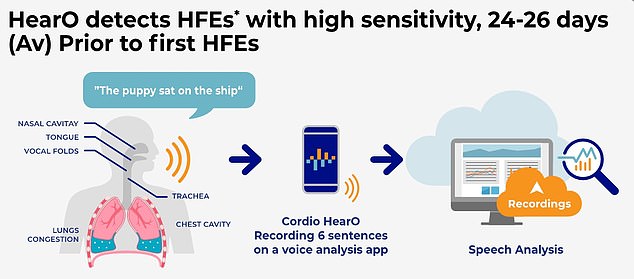Speaking from the heart: New smartphone app predicts cardiac failure WEEKS in advance – by listening to subtle changes in user’s voice
A new smartphone app can predict who is at risk of being hospitalized with heart failure simply by listening to their voice.
The AI-powered app listens for subtle changes in users’ voices that could indicate increasing fluid in their lungs – a sign of a deteriorating heart.
The more obvious signs of heart failure normally only start to appear a few days before someone is admitted to the hospital or goes into cardiac arrest.
But in a study of hundreds of elderly people with heart failure, the HearO app was able to predict who would deteriorate and need to be hospitalized three weeks before it happened.
The app was correct 76 percent of the time. It has already received Breakthrough Device Designation, meaning approval by the Food and Drugs Administration (FDA) will be accelerated, and is on track to receive approval in 2024.
Patients are asked to speak six sentences into the app, called Hearo, every morning. An AI algorithm then analyzes their speech for symptoms of impending heart failure

Speech can be affected by fluid in the lungs, swelling of the soft tissues and vocal tract, and swelling of the vocal cords. Fluid in the lungs causes the patient to generate less air and the airways become blocked, causing the voice to become muffled
The Ohio State University researchers who developed the app say the advanced alert gives doctors time to start preventive treatment and could save lives.
One in four Americans will develop heart failure during their lifetime and approximately 6.7 million Americans over the age of 20 live with the condition, which is expected to rise to 8.5 million Americans by 2030.
Heart failure occurs when the heart muscle cannot pump enough blood to meet the body’s needs for blood and oxygen.
This can result in fatigue, fluid retention, shortness of breath and sometimes excessive coughing.
If left untreated, it can lead to fatal cardiac arrest.
Dr. William Abraham, lead author of the study and professor of medicine, physiology and cell biology at Ohio State University, said his fellow doctors heard changes in patients’ voices when they came to the hospital with pulmonary edema – an abnormal build-up of fluid in the lungs. .
Fluid in the lungs causes the patient to generate less air and the airways become blocked, causing a person’s voice to sound muffled.
Speech can be affected by fluid retention as it causes swelling of the vocal cords and swelling of the soft tissues and vocal tract.
Researchers wanted to know if the changes in their patients’ voices were noticeable earlier, because doctors may not communicate with their patients every day.
“The lungs are the energy generator of speech,” Dr. Abraham told reporters at the American Heart Association conference in Philadelphia, Pennsylvania.
Every morning, patients are asked to use their phone and speak six sentences into the app, called HearO.
The data is then uploaded to a data-secure cloud-based system where it is analyzed and where the ‘AI magic happens’.
The patient acts as its own control person and the app alerts the patient’s doctor if there is a significant change from the patient’s baseline voice that could indicate or predict worsening heart failure.
In a study, 416 adults in Israel diagnosed with heart failure were enrolled to test how well the app worked.
The participants were an older group of patients with heart failure who were clinically stable but at risk of their condition worsening. based on previous heart failure and hospital admissions.
There were more than 250,000 voice recordings assessed by the app’s AI system to come up with a predictive algorithm.
There were a total of 72 cases of heart failure in the study and the AI was able to predict first hospital admissions with an accuracy of 81 percent.
A heart failure event was defined as a patient’s heart failure worsening to the point where hospitalization was required.
In total, the app detected about 76 percent of impending or future cases of heart failure.
Crucially, the report predicted this an average of 24 days before the patient needed to go to hospital.
This provides a “broad opportunity for medical intervention to perhaps allow us to keep these patients healthy and prevent future hospitalization for heart failure or the need for IV diuretic therapy in the treatment of these patients,” said Dr. Abraham .
Dr. Abraham told DailyMail.com that the technology is far superior to that of a human doctor.
He said: ‘The doctor should wait until there are visible signs or symptoms of worsening heart failure. This approach detects it before these signs and symptoms occur.
‘Usually, the (visible) signs and symptoms (of heart failure) only develop two or three days before hospital admission. Here we get a three-week warning.’
The app is currently being tested in a phase III clinical trial.
